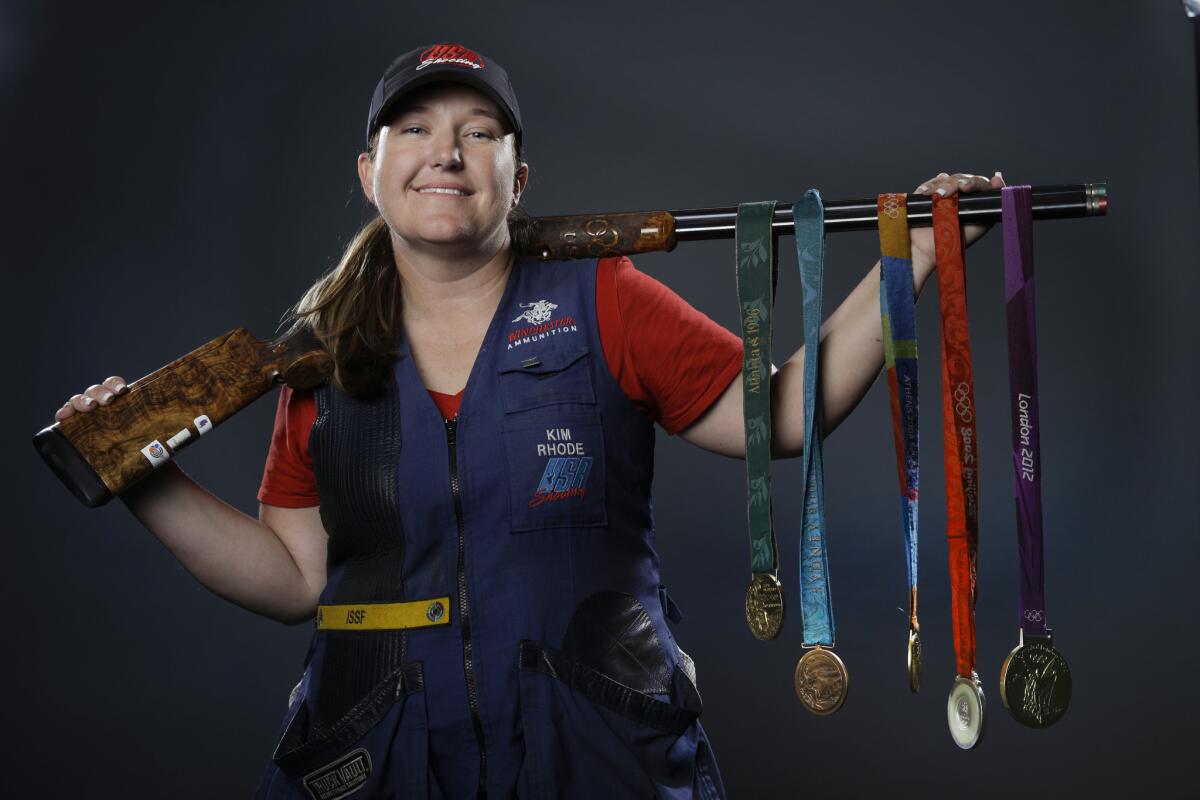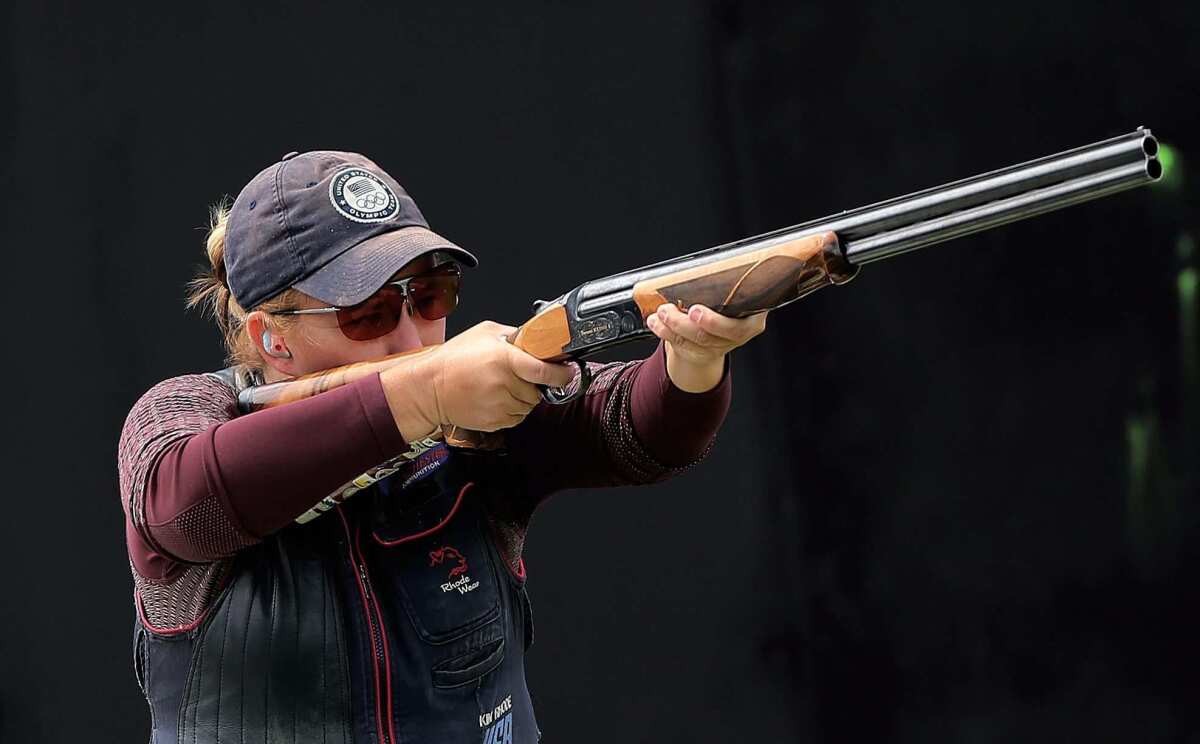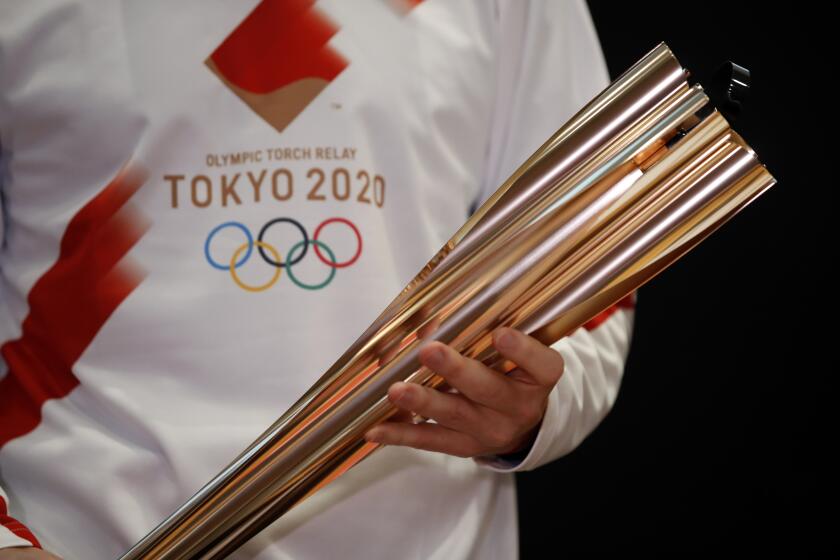Six-time Olympic skeet-shooting medalist Kim Rhode fails to qualify for Tokyo Games

- Share via
Laughter erupts from the other end of the phone line. It is not what one expects to hear from Kim Rhode.
“I know,” she said. “I lot of people thought I’d be crying.”
Those people know Rhode as an Olympian of historic proportions, a skeet shooter who won medals at six consecutive Summer Games. Her streak came to a shocking end Sunday when she failed to make the American team headed for Tokyo.
“I have no excuses,” she said.
The morning after falling short at a grueling, four-day USA Shooting trials in Tucson, the 40-year-old Southern Californian did not hesitate to discuss her stumble, talking by cell phone during a long drive home.
Skeet can be intense and unforgiving, with competitors firing shot after shot at clay targets launched from various angles. Any slip, anything short of a perfect score in each round, can mean defeat.
A look at how sports leagues, including the NFL, MLB, MLS, NBA and NHL, are responding to the coronavirus outbreak.
In Tucson, Amber English and Austen Smith got off to fast starts and held onto the top two spots. This will be the first Olympics for both.
“I’m just in shock, really,” Smith told the USA Shooting website. She added that Rhode had been “my idol ever since the start. She’s who I aspire to be, really.”
Less than 24 hours after finishing fourth, it wasn’t clear what went wrong for Rhode, who as recently as last year was on the gold-medal U.S. team at the world championships. While some countries give preferential treatment to veterans, the U.S. traditionally forces even its best athletes to earn a roster spot before each Games.
“It’s something you can’t take for granted,” Rhode said. “Every time, you have to qualify.”
Her tale began in 1996 when, as a teenager, she won gold at the Summer Olympics in Atlanta. Success continued from there, repeating in four-year cycles.

There were three golds, a silver and two bronzes over the next two decades of firing a shotgun in skeet and double trap.
Along the way, Rhode gave birth to a son in 2013 and suffered complications, eventually having her gall bladder removed. Still, she rebounded to finish third at the 2016 Rio de Janeiro Games.
That experience is now helping her deal with a different sort of obstacle and the unfamiliar pain of losing.
“It makes my journey even more amazing,” she said. “I don’t see the end in sight.”
Shooters can compete at a world-class level well into their 40s, so at this point Rhode intends to try for the 2024 Summer Games in Paris and 2028 in Los Angeles.
As part of a national effort to contain the coronavirus outbreak, officials in Greece have barred spectators from the traditional lighting of the Olympic torch this week.
Her life has also been busy away from competition as she helps launch a local shooting range that she hopes will become a national training center. As a board member for the National Rifle Assn., she has lobbied to change California’s ammunition restrictions which, she says, make it tough for her to train daily.
Television might also be a possibility.
As a recent guest on the “Project Runway” reality show, the self-professed “blue-jeans-and-baseball-cap kind of girl,” found herself modeling a custom-made gown and hoping she would not trip over her high heels.
Now, with her summer schedule open, she might land back on the air in Tokyo.
“Maybe I’ll end up commentating,” she said. “You never know.”
In the meantime, there is a birthday party to plan for six-year-old Carter — Nerf guns are a strong possibility. Her husband asked what else she might do with her unexpected free time.
“I’m going to the range,” she told him. “I’m going to shoot.”
More to Read
Go beyond the scoreboard
Get the latest on L.A.'s teams in the daily Sports Report newsletter.
You may occasionally receive promotional content from the Los Angeles Times.









